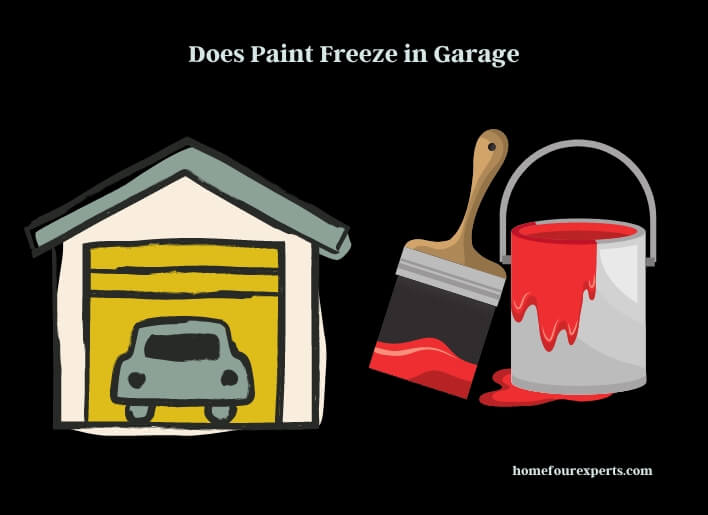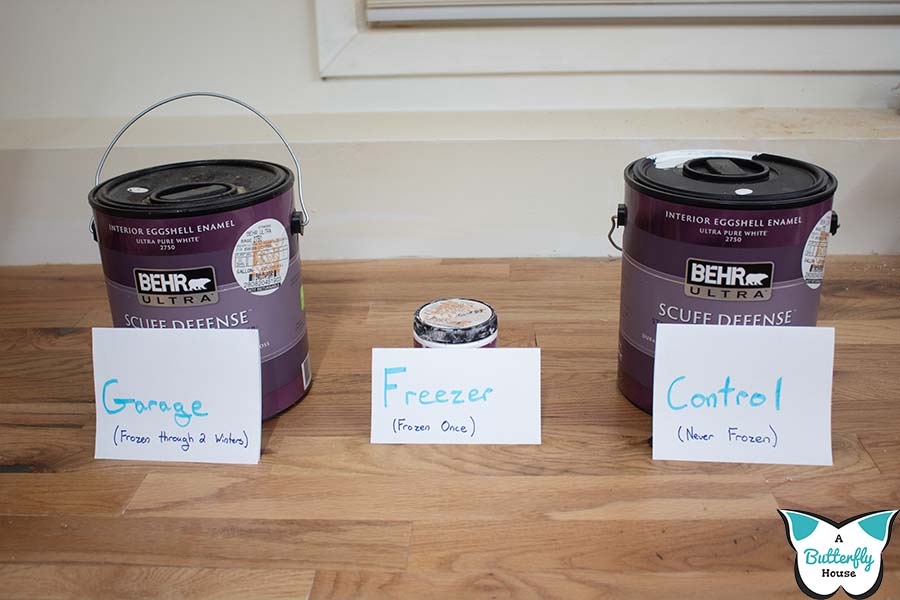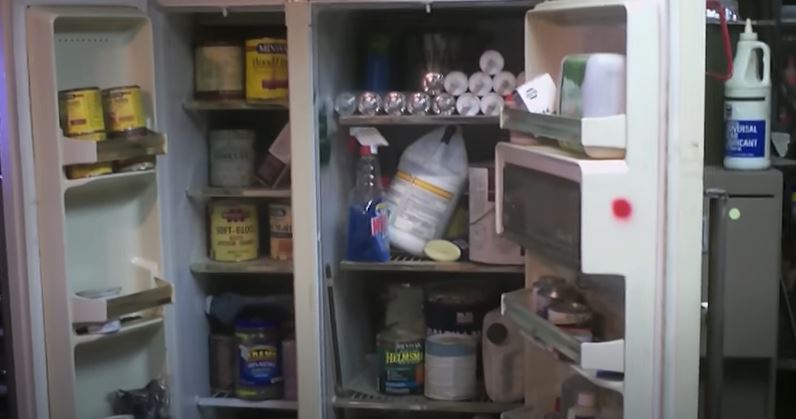Published on: November 20, 2022
Written by Eric Devin / Fact-checked by David Rowan
It’s that time of year again when the temperatures start to drop and we all have to start preparing for winter. One thing you may be wondering is whether or not paint will freeze in your garage. The answer is yes, paint can freeze and it can cause some serious problems.

When the temperatures outside start to dip, it’s important to take steps to protect your home from the cold. One area that you may not think about is your garage. If you have paint stored in your garage, you may be wondering if it will freeze and become unusable.
Paint can freeze, but it doesn’t happen often. The biggest risk is if the paint is stored in an unheated garage or shed where the temperature can fluctuate wildly. If the paint does freeze, it’s not a big deal.
Just let it thaw out and give it a good stir before using it again.
Does Paint Get Ruined If It Freezes?
Yes, paint can definitely be ruined if it freezes. Paint is made up of a variety of different ingredients, including water, pigments, resins, and solvents. When these ingredients freeze, they can separate and the paint can become unusable.
So if you’re planning on painting in cold weather, make sure to keep your paint cans warm and avoid letting them freeze.
Can You Leave Paint in Garage Over Winter?
It’s not uncommon for homeowners to leave leftover paint in the garage after a project. But is it safe to leave paint in the garage over winter? The short answer is yes, you can leave paint in the garage over winter.
However, there are a few things you should do to ensure that your paint stays in good condition.
Store Your Paint Cans Upside Down
If the temperature in your garage gets below freezing, be sure to store your paint cans upside down. This will prevent the cans from rusting and the lids from popping off.
Tightly Seal Them Before Storing Them in the Garage
If you have any opened cans of paint, be sure to tightly seal them before storing them in the garage. This will keep the paint from drying out and becoming unusable.
Try to Store Your Paint Cans
Finally, if possible, try to store your paint cans in a cool, dark place. Extreme heat or sunlight can damage the paint and make it difficult to use later on. By following these simple tips, you can safely store your leftover paint in the garage over winter without worry!

How Do I Keep Paint from Freezing in My Garage?
When the temperature outside begins to drop, many homeowners are concerned about the possibility of their paint freezing. After all, paint is a liquid and it can be difficult to keep liquids from freezing when the temperature gets cold enough. However, there are a few things that you can do to keep your paint from freezing in your garage.
| First | Make sure that you store your paint in a cool, dry place. If possible, try to keep it out of direct sunlight as well. |
| Second | If you know that the temperature is going to drop below freezing, bring your paint inside overnight or for extended periods of time. This will help to prevent the paint from freezing solid. |
| Third | Invest in some anti-freeze additives for your paint. This additive will lower the freezing point of the liquid so that it can withstand colder temperatures without actually freezing solid. |
| Fourth | Consider using latex-based paints instead of oil-based paints during cold weather months. Latex-based paints are less likely to freeze than oil-based paints since they contain more water molecules that act as anti-freezing agents. |
By following these tips, you should be able to successfully store your paint in your garage without having to worry about it freezing solid and becoming unusable.
At What Temperature Does Paint Freeze?
Different types of paint have different freezing temperatures. For example, water-based paint can freeze at 32°F, while oil-based paint can freeze at 40°F. If the temperature gets cold enough, both types of paint will freeze and become unusable.
To avoid this, always store paint in a cool, dry place and check the labels for specific storage instructions.
Is Paint Ruined If It Freezes?
If the paint can is frozen, don’t despair. Although the paint will be ruined, the can may still be usable. To thaw a frozen paint can:
Remove the lid and set it aside. Wrap the entire can in a towel soaked in hot water. Apply heat to the bottom of the can with a hair dryer set on low or a household iron set on low (no steam).
Check frequently to see if the contents have begun to liquefy. When they have, stir well and replace the lid tightly. If necessary, add more hot water to keep the towel wet.
Once thawed, use immediately or store in a cool, dry place according to the manufacturer’s directions usually no longer than 24 hours.
What Temperature Does Latex Paint Freeze?
Latex paint can freeze at any temperature but is most likely to do so when the temperature outside is below 32 degrees Fahrenheit. If your paint has frozen, don’t worry! You can still use it once it thaws out.
Just give it a good stir and it will be as good as new.
How Long Does It Take for Paint to Freeze?
Assuming you are talking about water-based paint, it will start to freeze at 32 degrees Fahrenheit. However, it can take days or weeks for the paint to actually freeze solid. The amount of time it takes for the paint to freeze will depend on how much paint is in the container and how cold it is outside.
If you are using oil-based paint, it will start to freeze at a lower temperature than water-based paint.
Can Paint Freeze Overnight?
If you’ve ever left a can of paint outside overnight, you may have found it frozen solid the next morning. But does this mean that paint actually freezes?
Technically, yes.
Paint is a mixture of Pigment (the color) and binder (the liquid that holds it all together). When paint freezes, the water in the binder expands and breaks apart the molecules, causing the paint to become crumbly and unusable.
So if you’re planning on painting in cold weather, be sure to bring your cans inside overnight!
Otherwise, you may find yourself with some expensive garbage come morning.
Lowest Temperature to Store Paint
As the temperature starts to drop, many of us are getting our homes ready for winter. One thing we have to be careful of is making sure our stored paint doesn’t freeze.
Paint can freeze at temperatures as low as 35 degrees Fahrenheit, so it’s important to store it in a cool, dry place.
If your paint does freeze, don’t worry – just let it thaw out slowly and stir it well before using it.
If you’re not sure where to store your paint, a good rule of thumb is to keep it somewhere that’s between 50 and 70 degrees Fahrenheit. A basement or laundry room is usually a good bet.
Just make sure the area is well-ventilated so the paint doesn’t get too humid.
With a little bit of planning, you can rest assured that your paint will be in good condition when spring rolls around!
Storing Paint Temperature Celsius
As an artist, it’s important to be aware of the different ways to store your paint. Temperature is one factor that can affect the quality of your paint, so it’s important to store it in a place that won’t get too hot or too cold. Celsius is a measurement of temperature, and it’s important to know how to convert it when storing your paint.
Here are some tips on storing paint at the right temperature in Celsius. Paint should be stored at a cool, consistent temperature. The ideal range is 10-15 degrees Celsius (50-59 degrees Fahrenheit).
If the temperature gets too high, the pigments in the paint can start to break down and fade. If it gets too cold, the paint can become thick and difficult to work with. If you’re planning on storing your paint for an extended period of time, consider investing in a storage system that will keep the temperature stable.
There are many options available, from specialized storage containers to climate-controlled rooms. Whatever option you choose, make sure you monitor the temperature regularly to ensure that your paint stays in good condition.
Can Water-Based Paint Freeze?
If you live in a climate where freezing temperatures are common, you may be wondering if your water-based paint can freeze. The short answer is yes, it can. However, there are a few things to keep in mind if you’re planning on using water-based paint in cold weather.
Thicken as the Temperature Drops
Water-based paint will thicken as the temperature drops. This means that it won’t flow as smoothly and will take longer to dry. It’s important to stir the paint regularly while you’re using it to make sure that the pigments are evenly distributed.
Otherwise, you may end up with an uneven finish.
Bubbles to Form in the Paint
Freezing temperatures can cause bubbles to form in the paint. These bubbles will pop once the temperature rises again, leaving behind small craters in the paint job.
To avoid this problem, make sure that you apply a thin layer of paint so that any bubbles have room to expand without ruining the finish.
Susceptible to Chipping and Flaking in Cold Weather
Remember that water-based paint is more susceptible to chipping and flaking in cold weather than other types of paint. This is because the water inside the paint expands when frozen and then contracts as it thaws out again.
To protect your painted surfaces from this type of damage, consider applying a clear sealant over the top of the finished project.
How to Keep Paint from Freezing in Garage?

As the temperatures start to drop, it’s important to take measures to protect your paint supplies from freezing. Here are a few tips on how to keep paint from freezing in your garage:
| 1 | Keep paint cans tightly sealed when not in use. This will help prevent any moisture from getting inside and freezing the paint. |
| 2 | If you have unused paint that you know you won’t be using anytime soon, consider storing it in a cool, dry place like a basement or storage shed. |
| 3 | Make sure your garage is well-insulated to help maintain a consistent temperature. This will minimize the risk of your paint freezing overnight or during periods of extreme cold weather. |
| 4 | Consider using a space heater in your garage during colder months to help keep the area warm enough for painting projects. |
By following these simple tips, you can help ensure that your paint stays usable all winter long!
Wrap Up
It’s a common question we get here at Paintzen: does paint freeze in the garage? The answer is yes, but there are a few things you can do to prevent it. Here are a few tips:
1. Store your paint in an airtight container. This will help keep the moisture out and prevent freezing.
2. If you live in an area with extremely cold temperatures, consider storing your paint indoors during the winter months.
3. Bring your paint containers inside overnight if there is a chance of frost or freezing temperatures.
4. Add an anti-freeze agent to your paint before storing it for the winter. This will help keep it from freezing solid.
About This Writer

Hi, I am Eric Devin and I am a professional interior architect. Since childhood, I've always enjoyed DIY projects! And, I have loved to solve simple household problems using essential tools and equipment. I have also acquired a lot of information about basic household tools settings by working with contractors.